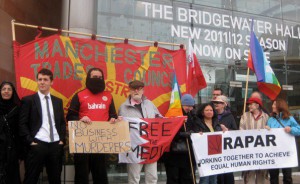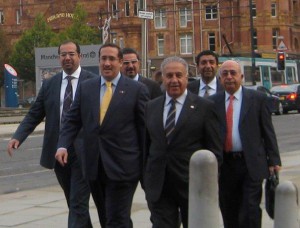Outrage as Manchester businesses roll out red carpet for Bahraini royal
Article published: Friday, October 14th 2011
Health workers, trade unionists and refugees staged a demonstration yesterday against the invitation of a member of the Bahraini royal family to a business event organised by Greater Manchester Chamber of Commerce and the government export body UK Trade and Industry (UKTI).
 Protestors shouted “free the nurses” and “murderer” at the dignitary, Sheikh Mohammed bin Isa al-Khalifa, as he was escorted into Manchester’s Bridgewater Hall to host a trade seminar entitled “Doing Business with Bahrain”.
Protestors shouted “free the nurses” and “murderer” at the dignitary, Sheikh Mohammed bin Isa al-Khalifa, as he was escorted into Manchester’s Bridgewater Hall to host a trade seminar entitled “Doing Business with Bahrain”.
The Gulf island state has attracted international criticism in recent months for its crackdown against pro-democracy demonstrators that has left roughly 30 dead and seen hundreds detained, including the jailing of medical professionals who had treated protestors. Among the critics is senior US senator Dick Durbin, who along with five other Democratic congressmen recently petitioned President Obama to halt a $53 million arms sale to Bahrain due to “ongoing human rights violations and unwillingness to acknowledge legitimate demands for reform.”
Attending the protest were refugee journalists and others from Bahrain, and some demonstrators covered their faces for fear of reprisals. Speaking to MULE, Manchester activist Nahella Ashraf said: “I think it’s absolutely shocking that Manchester chamber of commerce would host a meeting with Bahraini businessmen when they know what’s happening in Bahrain. People are being shot by the regime, they’re being imprisoned, nurses and doctors are being imprisoned for over ten years.”
Secretary of Manchester Trades Council Geoff Brown also objected to welcoming the delegation, noting that the Bahraini government was facing some international pressure, including the cancellation of the F1 Grand Prix, and was keen to improve its image. “Formally, this is about business. Really, it’s about respectability”, he said, denouncing “the cheek that they would come here and pretend to be a respectable operation as they tout for business here in Manchester.”
Accompanied by 12 Bahraini companies, al-Khalifa is touring London, Birmingham and the North West in his capacity as chief executive of the Bahrain Economic Development Board to promote greater trade links with the UK. Although small, with a resident population of just over 1 million, half of which are expatriate workers, the country is a major financial centre and trading hub in the Middle East and hosts the US Navy’s Fifth Fleet due to its strategic location in the Persian Gulf between neighbouring Saudi Arabia and Iran.
The World Bank ranks the country as the 28th highest in the world for ease of doing business in 2011 and UKTI is keen to promote relations with the state, noting its “favourable tax regime”, well-educated population, proximity to lucrative Middle Eastern markets and ongoing major privatisations of its telecommunications, utilities and transport facilities. Al-Khalifa also boasts a Bahraini economic growth rate of 2 per cent, although this figure has halved since 2010 according to UKTI figures.
With Bahrain’s oil reserves running dry finance and manufacturing have become important sectors of its economy, worth 25 and 16 per cent of its GDP respectively, and existing North West links include Bahrain Fibre Glass International, which recently won the contract to reclad the walls of the Mersey Tunnel, and Manchester investment firm Consilia Partners.
Controversy has been stirred by increasing political tensions and human rights violations in the state however, and Human Rights Watch (HRW) has documented “credible” reports that “since the end of 2007, officals again have used torture and ill-treatment, particularly during the interrogation of security subjects.” Bahrain denies that torture is systematic, although a US embassy cable uncovered by Wikileaks revealed that officials “appear to understand that the HRW report represents a significant challenge internationally and domestically.”
The human rights watchdog called on the country to “take prompt action to ensure that torture and ill-treatment are once again eradicated from the practices of security officials”. The creation of Bahrain’s security services was overseen by British national Ian Henderson OBE, alleged to have been heavily involved in torture and nicknamed “the Butcher of Bahrain” for his role in putting down uprisings in the 1990s, and HRW further warned that Britain, which still provides officers to train the Bahraini police, “may risk being implicated” if it co-operates “with law enforcement forces they know or should know are employing torture or other ill-treatment.”
Tensions culminated last spring in the violent suppression of mass movements demanding democratic reforms and an end to alleged discrimination against the country’s Shia majority by the Sunni royal family. Demonstrations in February were dispersed by government troops using live ammunition, and subsequent protests in March saw the foreign intervention of Saudi and United Arab Emirates forces in an attempt to quell the uprising. The Bahraini government has since established a “Bahraini National Dialogue” to open reconciliation talks, although HRW official Joe Stork has noted that only 15 opposition members have participated and this week opposition parties jointly denounced the country as a police state.
Hospitals and medical institutions were besieged and occupied by security services during the uprising on the pretext that anti-government forces had rioted, occupied clinics, taken hostages and denied medical treatment to Sunni patients. A HRW report cast doubt on these claims, noting that “information that would support these allegations” had not been forthcoming from the authorities, and warned of “what appears to be a systematic campaign by the Bahraini government aimed [at] punishing and intimidating medical professionals suspected of sympathies with protestors and hindering access to health care facilities for persons wounded by security forces.”
Two weeks ago 20 doctors were sentenced to prison terms of between 5 and 15 years by a military court, a verdict that has since prompted the country’s Public Prosecutor to order a retrial. Amnesty International condemned the judgement as “a travesty of justice” and the move inspired some Manchester medical workers to demonstrate against Al-Khalifa’s presence in the city, with MRI employee Matthew Hampson explaining to MULE how he “felt compelled as a health worker in Manchester to come along here to protest against the Bahraini business conference…we can’t just let this lie.”
Greater Manchester Chamber of Commerce failed to respond to queries as to why they judge Bahrain to be a suitable partner for the city’s businesses. For his part, Al-Khalifa told the Manchester Evening News that “what we are all working towards is building a more democratic country. The debate is about how fast to get there.”
Richard Goulding
More: Local economy, News
Comments
-
Anybody else remember a certain Richard Leese’s trip (along with a huge entourage) to Abu Dabhi, capital of the UAE, a couple of years ago?http://www.youtube.com/watch?v=jZLXfiu9GUU It seems like human rights go out of the window when our city’s leaders are chasing the golden egg of ‘investment’
Comment by Red Mick on October 14, 2011 at 5:21 pm - Comment by Red Mick on October 14, 2011 at 5:22 pm
The comments are closed.




